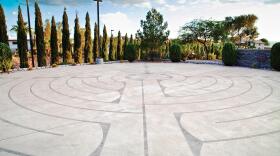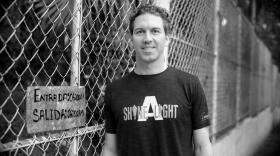Life with the squatters next door
It is a little house on a typical Las Vegas street.
This is one of the city’s oldest residential neighborhoods, close to Downtown, and this house, like its neighbors, was built in 1950, when the town was still getting a reputation as the nation’s red-light district and the government still detonated nuclear weapons in the desert.
Lately, this little house has been part of a more modern history in Las Vegas. Like thousands of other homes, it was foreclosed upon. Like thousands of other homes, it saw a succession of bad things happen after that: Since the foreclosure two years ago, squatters have frequently occupied the house.
It has had its postwar-era copper plumbing ripped out of the walls and floorboards. It has had the water turned on, flooding the house and the street. It has been rented out, apparently by people who do not own the property. Its big backyard has kenneled as many as 17 dogs at once. Now its front porch is littered with debris, the tenant appears to be gone and the weeds are out of control.
I have seen it all. I am the neighbor.
When I moved into the neighborhood near Downtown’s historic Huntridge barrio in 2009, a large, boisterous Hispanic family rented the property next door. They were great neighbors, although I thought their decision to cover their dusty backyard with carpet remnants was weird. Occasionally they would leave a box of fruit on my front porch.
But, in February 2014, the hammer fell. The family had been paying rent, but the owner hadn’t been paying the mortgage. They had to move out. U.S. Bank, based in Minneapolis, bought the house in a foreclosure auction for $135,000 and change.
Almost immediately, the squatting began.
Vagrants broke into the backyard and knocked out doors and windows to get into the house. To get into the backyard, they usually ripped a large metal gate from its hinges. A neighbor and I spent more than a few days and nights trying to repair the mangled gate.
Such activity is common in this city, which the Las Vegas Sun has called a “squatters’ paradise.” The number of squatter-related calls Metro received has risen yearly, topping 4,400 in 2015, according to the paper (that’s a 169 percent increase over 2012). Illegal residents have brandished fake leases, changed locks and exploited weak laws related to squatting to remain in other people’s homes.
Next door, piles of trash, beer cans and other detritus started to pop up around the property. It didn’t bother me too much if the trash was bagged. Sometimes, though, trash was just dumped, unbagged and without ceremony, in my driveway, and I had to collect it, accompanied by much sputtering and cursing. Around the same time, someone ripped out the copper plumbing. The neighborhood was alerted to this issue when a river of water flowed from the house into the street.
Eventually, Las Vegas Code Enforcement got involved. Officers posted tickets on the property, and the bank hired a management company to periodically repair the gate and attempt to secure the house. The company cut the weeds in the front yard a couple of times.
At one point, a woman from the property-management company knocked on my door. Was someone living next door? Yes, I said, a man had moved in recently. I was happy someone lived there.
No, she said. The house was not sold. There was no lease. The person claimed to have a deed based on the legal strategy that if the house was vacant, they had a right to move in and take the property. The bank, it seems, disagreed with this interpretation of property law, as potentially fruitful as it would be for so many would-be home and business owners.
So for a few weeks the house stood empty again.
It was about this time, a year ago, that Animal Control took away numerous dogs. Who left them there? I don't know! Like much in this story, that question isn't answered in the official record.
After that, a gentleman moved in on a more permanent basis. He brought a girlfriend and several dogs. We’ll call him Jesse; I never learned a last name. He replaced the plumbing and fixed the air conditioner, turned on the water, reconnected the electricity. I don’t think he ever cut the weeds, though, and the cops were out to talk to him a couple times, and so the neighbors weren’t happy with him. He was cool with me even though I called Animal Control once when his barking dogs got super annoying.
I checked every couple of weeks to see if the property had switched ownership, but no, U.S. Bank continued to own it, along with a couple of hundred other houses all over the valley. Jesse said he was paying rent to a manager.
I asked the bank’s spokesman, in Minneapolis, what was happening with the property — why the bank had a tenant in the little house on my street. I got a partial explanation: U.S. Bank is “in the process of conveying the property” to the federal government because the mortgage is insured with the Federal Housing Administration, said Teri Charest, the bank’s head of external communications for consumer and small-business banking, in an email.
“The property is currently occupied,” she wrote. “We are required to follow specific legal procedures in each state to get the property in the vacant condition needed to transfer the property to HUD (the Housing and Urban Development Department). We are actively working those processes now. However, as long as there is a tenant, we are not able to provide service to the property.” She could not tell me how the tenant had moved in.
That’s an example of the issue’s ill-defined legal status; often, police were forced to treat squatting as a civil dispute, a landlord-tenant problem. Hoping to give property owners some relief in such scenarios, the 2015 Legislature passed laws that specifically criminalized outlaw occupancy. They took effect October 1.
Recently, Jesse moved out.
He left a couple of dogs, which barked a lot. All night long. I think dogs that are left alone all day, even if they have food and water, go a little bonkers and bark in an effort to communicate. Eventually they were gone. The house is still a mess. There’s debris and a cheap dining-room chair on the front porch. The last time I talked to Jesse, he told me he’d been paying rent for nine months and that gave him some legal ownership of the house. He was, he said, “renting to own.” That doesn’t seem to be the bank’s point of view.
Folks are fascinated by squatters in Las Vegas. There was a big New York Times feature on the subject recently, filled with anecdotes about phony leases, counterfeiters and confrontations, and I know other national journalists are looking at the issue here, too. One thing I can promise you, at least in my neighborhood: If a house is left vacant, without someone regularly checking on it, people will move in.
I can’t say what the next chapter will be for this house next door. It seems empty now, just another of the 13,000 vacant homes the Sun says exist in the valley — but for how long? Will turning it over to HUD help or hurt its future as a place where people, a family, live full-time? I don’t know. I do know that its present condition gives the neighborhood a creepy vibe. It sticks out. Now Code Enforcement is ordering someone, the bank or the nonexistent tenant or somebody, to clean up the property, but that hasn’t happened so far.









